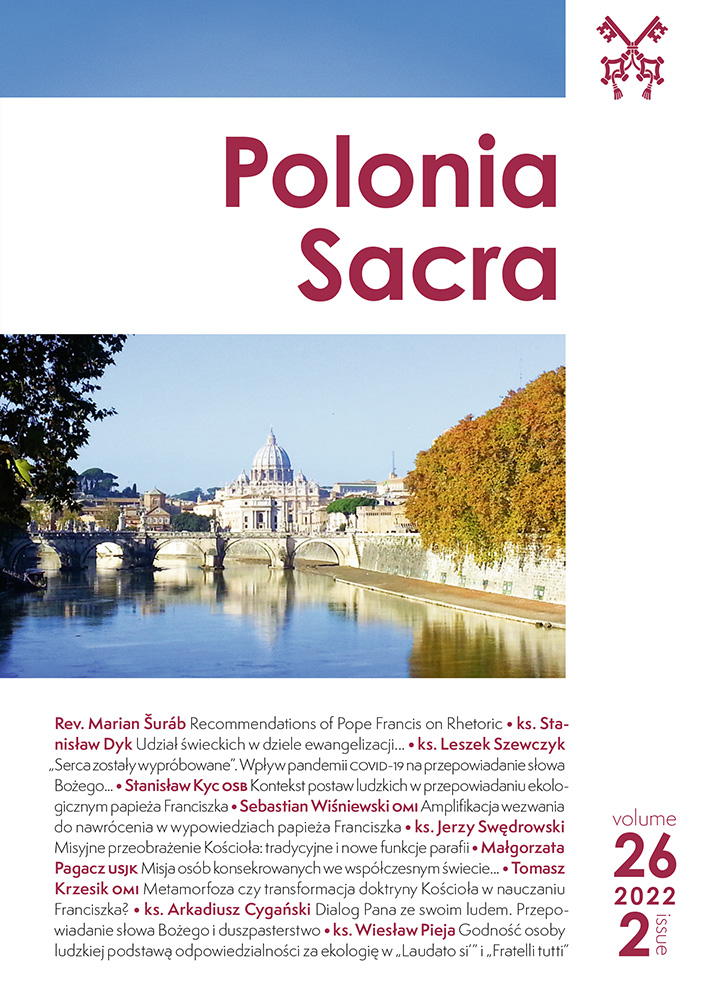The Missionary Transformation of the Church: The Traditional and New Functions of the Parish
DOI:
https://doi.org/10.15633/ps.26206Keywords:
parish, mission, community, meeting, word of GodAbstract
As we enter on the journey of faith we unite with Jesus Christ, and we desire to see life through His eyes. Faith is ecclesial in nature, according to St. Paul: “yet I live; no longer I, but Christ lives in me” (Gal 2, 20). In the dynamics of the Church, the parish is the place of a direct encounter with God and with people. Pastors in parishes preach the Word and administer the sacraments and thus build community. The measure of this commitment becomes the common good, which is realized in diversity. It is also the Christian way of life, both of the clergy and the laity, that permeates the entire community. Pope Francis has postulated the need for a missionary transformation of parish communities. In his vision, there is a need for a profound evangelization of what is the heritage of the past and the gift of the present. The parish is to become a sanctuary where people find faith, the sacraments and, in the culture of encounter, discover community.
References
Balter L., Rola liturgii w życiu wspólnoty parafialnej, w: W służbie Ludowi Bożemu, red. B. Bejze, Poznań–Warszawa 1973, s. 386–398.
Dziuba A. F., Perspektywy i wyzwania chrześcijaństwa, Pelplin 2014.
Franciszek, Christus vivit.
Franciszek, Evangelii gaudium.
Franciszek, Gaudete et exultate.
Franciszek, Laudato si’.
Jan Paweł II, Dies Domini.
Jan Paweł II, Ecclesia de Eucharistia.
Jan Paweł II, Pastores dabo vobis.
Kamiński R., Duszpasterstwo zwyczajne, w: Leksykon teologii pastoralnej, red. R. Kamiński, Lublin 2006, s. 217–220.
Kamiński R., Parafia miejscem realizacji duszpasterstwa, w: Teologia pastoralna, t. 2: Teologia pastoralna szczegółowa, red. R. Kamiński, Lublin 2002, s. 11–108.
Kamiński R., Parafia wspólnotą i instytucją. Aspekt historyczny, „Roczniki Teologiczno-Kanoniczne” 32 (1985) z. 6, s. 15–35.
Kamiński R., Przynależność do parafii katolickiej, Lublin 1987.
Kołodziejczyk J., Religijność słuchaczy, a ich oczekiwania wobec kazań, w: Słuchacz słowa, red. W. Przyczyna, Kraków 1998, s. 219–242.
Kongregacja ds. Duchowieństwa, Kapłan, pasterz i przewodnik wspólnoty parafialnej, Poznań 2002.
Kongregacja ds. Duchowieństwa, Nawrócenie duszpasterskie wspólnoty parafialnej w służbie misji ewangelizacyjnej Kościoła, https://www.ekai.pl/dokumenty/instrukcja-nawrocenie-duszpasterskie-wspolnoty-parafialnej-w-sluzbie-misji-ewangelizacyjnej-koscciola/ (25.09.2021).
Lewandowski T., Etos kaznodziei, w: Sługa słowa, red. W. Przyczyna, Kraków 1997, s. 214–229.
Mariański J., Apostolstwo świeckich w Kościele, w: W dwudziestolecie Soboru Watykańskiego II, red. J. Homerski, F. Szulc, Lublin 1987, s. 95–111.
Müller K., Homiletyka na trudne czasy, Kraków 2003.
Olszewski M., Duszpasterstwo parafialne, Białystok 2005.
Pałęcki W., Proboszcz, w: Encyklopedia katolicka, t. 16, red. E. Gigilewicz, Lublin 2012, k. 412–413.
Pałęcki W., Sanktuarium, w: Encyklopedia katolicka, t. 17, red. E. Gigilewicz, Lublin 2012, k. 1058–1059.
Potrzebna jest gruntowna zmiana metod głoszenia Ewangelii, rozmowa Piotra Dziubaka z ks. Armando Matteo, https://kair.ekai.pl/depesza/607694/show?style=print (08.10.2021).
Przyczyna W., Kaznodzieja jako herold, w: Sługa słowa, red. W. Przyczyna, Kraków 1997, s. 51–63.
Ripa A., Prezentacja Instrukcji Nawrócenie duszpasterskie wspólnoty parafialnej w służbie misji ewangelizacyjnej Kościoła. Prezentacja Instrukcji Kongregacji ds. Duchowieństwa, „L'Osservatore Romano” wyd. pol. (2020) nr 9, s. 35–37.
Sławiński H., Homilia niedzielna, Kraków 2015.
Stella B., Colagrande C., W poszukiwaniu tych, którzy są daleko, „L'Osservatore Romano” wyd. pol. (2020) nr 9, s. 37–38.
Sobór Watykański II, Lumen gentium.
Sobór Watykański II, Prezbiterorum ordinis.
Wielebski T., Nawrócenie pastoralne i duszpasterstwo misyjne parafii w Polsce, „Teologia i Człowiek” 45 (2019) nr 1, s. 105–119.
Downloads
Published
Issue
Section
License

This work is licensed under a Creative Commons Attribution 4.0 International License.
Authors who publish with this journal agree to the following terms:
- Authors retain the copyright and full publishing rights without restrictions, and grant the journal right of first publication with the work simultaneously licensed under a Creative Commons Attribution 4.0 International License that allows others to share the work with an acknowledgement of the work's authorship and initial publication in this journal.
- Authors are able to enter into separate, additional contractual arrangements for the non-exclusive distribution of the journal's published version of the work (e.g., post it to an institutional repository or publish it in a book), with an acknowledgement of its initial publication in this journal.
- Authors are permitted and encouraged to post their work online (e.g., in institutional repositories or on their website) prior to and during the submission process, as it can lead to productive exchanges, as well as earlier and greater citation of published work (See The Effect of Open Access).

